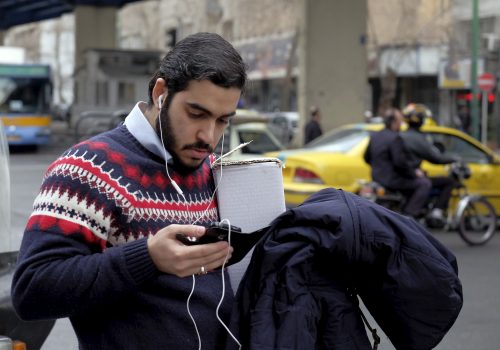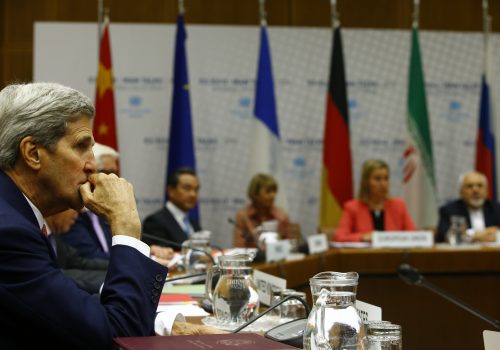The Biden administration needs to do more on Iran. Here’s why.
“One of the most famous cycle studios in the United States is called ‘SoulCycle,’” the US State Department’s Persian language Instagram account (@USABehFarsi) wrote on May 12, just as protests spread to dozens of cities and towns across Iran. The demonstrations, which began as early as May 6, were initially prompted by the Ebrahim Raisi government jacking up the prices of important food staples—including wheat, chicken, cooking oil, and eggs—to cut subsidies in an economy already beset by mismanagement, corruption, and US sanctions.
While it’s understandable that the Joe Biden administration would want to separate itself from its predecessor—which often singled out Iran for criticism of human rights abuses while giving a pass to other autocratic states—it took six days after the onset of nationwide protests and nine days after Internet disruptions were documented, for State Department Spokesperson Ned Price to issue any kind of statement. “The Iranian people have a right to hold their government accountable. We support their rights to peaceful assembly and freedom of expression online and offline—without fear of violence and reprisal,” Price posted on his official Twitter account on May 16. (Within hours, @USBehFarsi would post a Persian translation of his comments.)
No other higher level US official commented on the unrest which led to at least six protestors’ deaths and dozens arrested, and Internet shutdowns and disruptions in southern provinces where the protests were more widespread.
What’s become evident since the Biden administration took office in January 2021 is that its main interest in Iran pertains to containing its nuclear advances. Talks on restoring the 2015 Joint Comprehensive Plan of Action (JCPOA), which have gone on for more than a year in Vienna, are at an apparent standstill over the US refusal to unconditionally lift the Donald Trump administration’s Foreign Terrorist Designation of the Islamic Revolutionary Guard Corps (IRGC). Despite the sensitives around reviving the deal, the Biden administration shouldn’t tiptoe around other issues pertaining to Iran, particularly human rights—including Internet freedom—an issue the administration has stressed in regard to other countries and that was supposed to be a foreign policy priority.
With this in mind, the Biden administration can take several steps that will raise greater awareness of human rights violations in Iran and work with the private sector to directly combat Internet censorship, which Iranians use for economic, entertainment, and sociopolitical purposes.
First, the administration needs to expand its Iran policy portfolio to better reflect realities on the ground. While many Iranians celebrated the JCPOA as if the country had won a World Cup qualifier, many no longer see the deal—which the Trump administration quit in 2018 despite not violating it—as having the same potential and recognize that their problems go well beyond US economic sanctions and is their leadership. This is evident in the chants long heard during protests including, “We don’t want cleric’s ruling” and “No to Gaza and Lebanon! My life is for Iran!”—a reference to how the Islamic Republic spends scarce resources on its proxies.
While protests have, in fact, become normalized in the past few years, when unlawful force and near total Internet shutdowns occur anywhere, the United States should always speak out against such rights abuses, especially in repressive countries like Iran. In 2020, Amnesty International reported, in reference to November 2019 anti-government protests initially prompted by a fuel hike, in which security forces arrested and killed thousands, “authorities deliberately blocked Internet access inside Iran, hiding the true extent of the horrendous human rights violations that they were carrying out across the country.” This impunity is what many fear when Internet cuts and disruptions take place.
President Biden and Secretary of State Antony Blinken should always personally condemn Internet shutdowns and disruptions as well as the use of violence against protesters—even via tweet as such messaging is quickly shared in Iran on social media and messaging apps (once Internet services are back online). Former President Donald Trump regularly tweeted about widespread protests in Iran—sometimes even in Persian. During the 2009 post-election protests known as the Green Movement, then President Barack Obama condemned “the threats, beatings, and imprisonments” of protesters.
No doubt, the Iranian government will and has accused the US of meddling in Iranian affairs, including issuing a harsh response to Price’s comments. But Tehran will do that no matter what the Biden administration says. There are also plenty of instances when the Iranian government has commented critically about unrest in the US, most recently during the Black Lives Matter protests in 2020.
Iranians inside and outside Iran want to be heard, judging by countless social media accounts, including the activist collective @1500tasvir, which use social media as “accountability technology” to bring attention to what’s happening in the country. This information helps human rights organizations and the international community to document the abuses and killings.
A more vociferous reaction to Iran would take a major step forward in demonstrating to Iranians that their plight is recognized.
As part of a more consistent approach on Iran human rights, Internet freedom should also be considered. The Biden administration should, at the very least, start discussions with Silicon Valley companies about how to provide unfettered Internet access to Iranians in the event of a prolonged Internet shutdown or disruption. This avenue should be especially explored before the so-called “Protection Bill” potentially passes the Iranian parliament. Under this legislation, Iran would criminalize VPNs to “protect” Iranians from Western and other un-Islamic online content. Many Iranians view such a draconian action as isolating Iran and turning it into another North Korea. The most damning consequence of the bill is that it would create a National Information Network—a domestic Internet separated from the actual Internet—effectively severing Iranians from contact with the outside world.
While some Trump era officials, such as former deputy national security advisor Victoria Coates, recently suggested using Elon Musk’s Starlink project, that isn’t feasible. The satellite Internet company must gain licensed permission from the local government to access the infrastructure, as was the case in Ukraine.
Finally, more funding is needed to promote Internet freedom. The Trump administration, despite its opposition to the Iranian government, withheld $20 million in funding for the Washington-based Open Technology Fund (OTF)—an organization that helps activists, including Iranians, circumvent Internet censorship. More attention and money should be poured into such programs, including circumvention tools like Psiphon, as Internet shutdowns aren’t unique to Iran. In 2021, Access Now and #KeepItOn recorded 182 Internet shutdowns across thirty-four countries.
Keeping Iran’s nuclear program in check is an important US national security issue. However, having a consistent, actionable approach to Iran is what the Biden administration needs to stay on course with its human rights agenda. Now is a good place to start.
Holly Dagres is editor of the Atlantic Council’s IranSource blog, and a nonresident senior fellow with the Middle East Programs. She also curates The Iranist newsletter. Follow her on Twitter: @hdagres.
Further reading
Tue, Mar 30, 2021
An Iranian cleric, rights activist, and hacker entered a room—on Clubhouse
IranSource By Holly Dagres
It sounds like the beginning of a joke but in reality, that’s what happened recently in a Clubhouse chatroom discussing whether or not the hijab should remain mandatory in Iran.
Wed, Oct 27, 2021
Iranians give ‘Squid Game’ the green light
IranSource By Holly Dagres
With "Squid Game" becoming a global phenomenon, it’s no surprise that it’s also gaining popularity in Iran. But the Iranian fascination with the show comes at a time when Iran and South Korea are having their own drama.
Mon, Jul 13, 2020
The JCPOA: A bittersweet anniversary for Iran, the US and the wider world
IranSource By Barbara Slavin, Holly Dagres
The next US and Iranian governments will face many challenges, not least recovery from COVID-19 and economic recession.
Image: An Iranian uses his smartphones at a park in Tehran, Iran on April 24, 2021. The Iranian public is able to use Clubhouse, however Facebook and Twitter are still banned in Iran.( The Yomiuri Shimbun )


